
Major study to plug gaps in Indigenous health data
October 30, 2018
The biggest ever study of health and wellbeing among Indigenous adults will be launched Thursday.
Among the data to be collected by researchers is the impact of historical policy decisions such as the Stolen Generations and exposure to racism, as well as how culture is linked to wellbeing.
The Mayi Kuwayu study will kick off in Brisbane at the National Aboriginal Community Controlled Health Organisation Members’ Conference.
It is spearheaded by Australian National University Associate Professor and Wongaibon man Ray Lovett and is the first of its kind.
Hundreds of thousands of Aboriginal and Torres Strait Islander people are expected to participate.
“We are trying to plug gaps in data and change the mistaken narrative that being Aboriginal or Torres Strait Islander is the cause of ill health,” Associate Professor Lovett said.
“It is important because past policies likely contribute to intergenerational health and wellbeing outcomes for our mob.”
“Governments and statistical agencies are very reluctant to collect and report information on that.”
Professor Lovett said the main reason for the study was to highlight how Aboriginal and Torres Strait Islander identity, cultural participation and knowledge was linked to better health outcomes.
“For many Aboriginal and Torres Strait Islander people this concept is intuitive,” he said.
“We know if we maintain a connection to our country, to our languages, to strong family and kinship networks then that it is good for us, but we need the data.”
Associate Professor Lovett’s own grandmother was a member of the Stolen Generation, which has impacted on his own family.
“I’m a product of the Stolen Generations — my grandmother was taken,” he said. “This has had traumatic impacts within my own extended family.”
He said he hoped in the future Aboriginal and Torres Strait Islander health and wellbeing policy focussed on connecting and reconnecting people to their country and cultural knowledge.
The study has been more than three years in the planning.
People can tell their story online at mkstudy.com.au or call 1800 531 600.
https://nit.com.au/major-study-to-plug-gaps-in-indigenous-health-data/